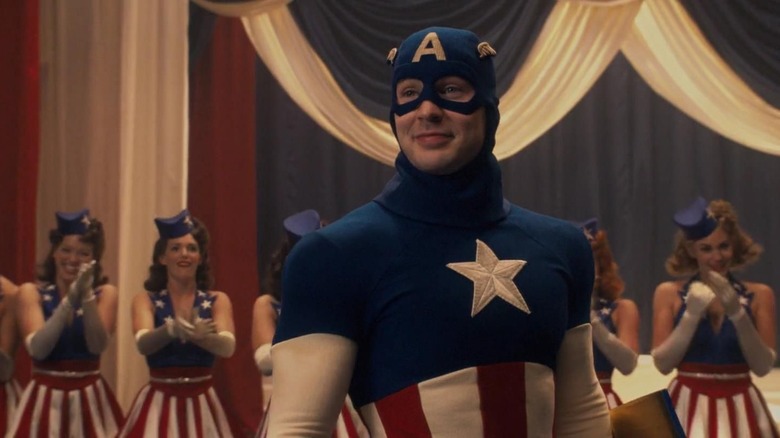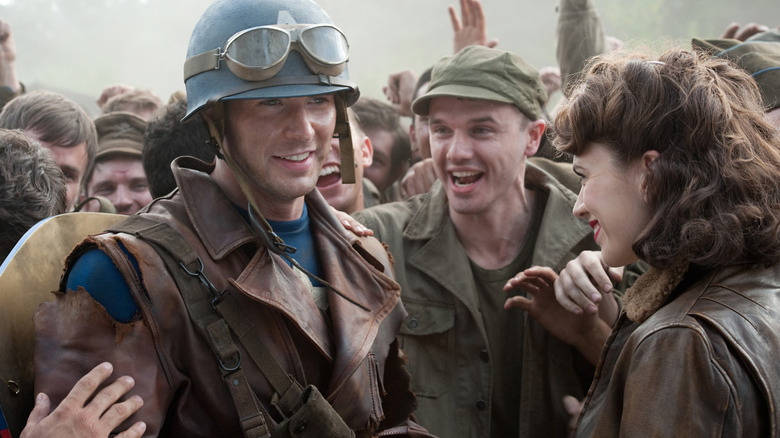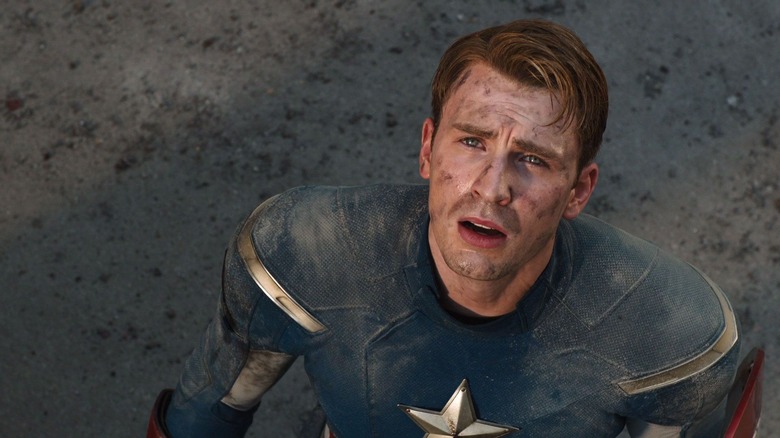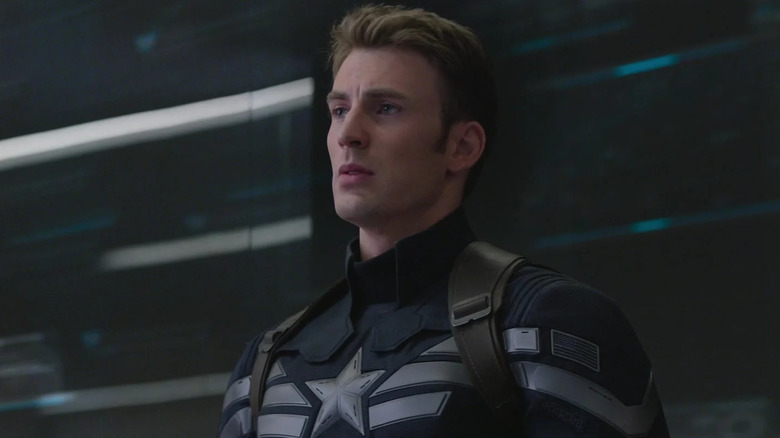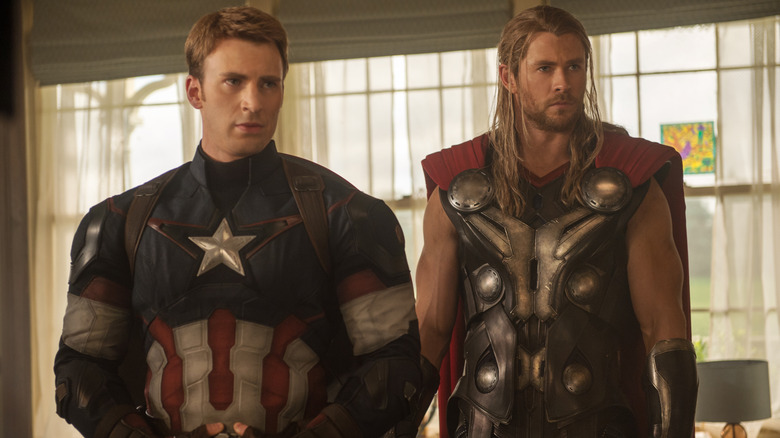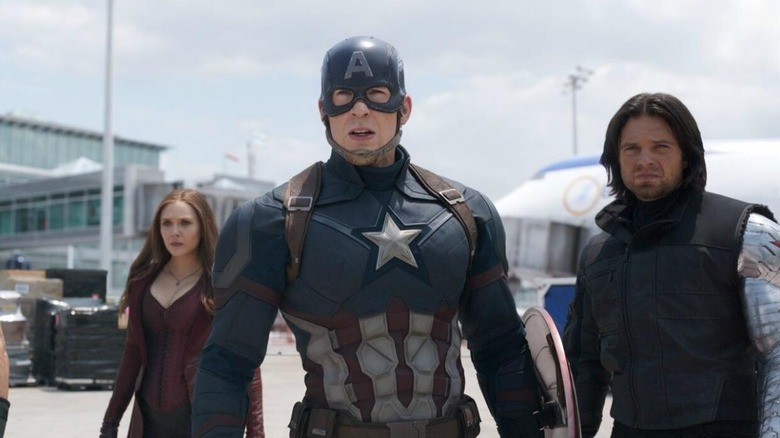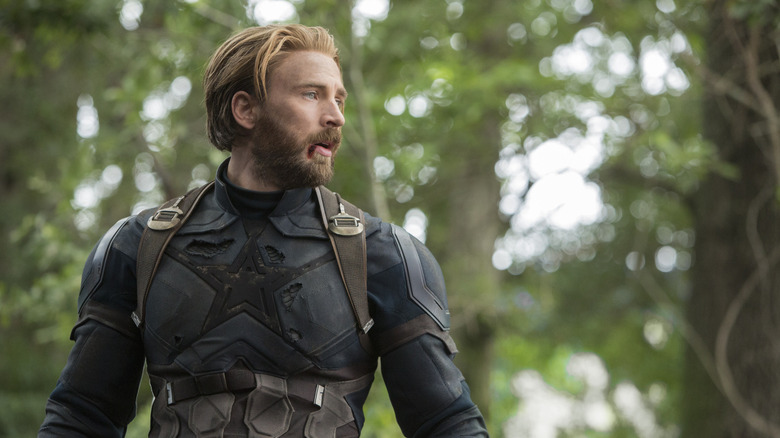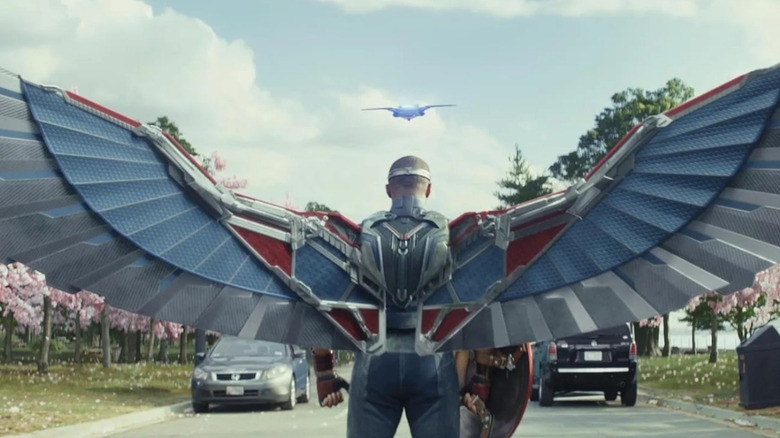The Correct Order To Watch The Captain America Movies
Captain America was created in 1940 by Joe Simon and Jack Kirby while they were working at Timely Publications, the company that would eventually become the Marvel Comics Group. Originally a piece of American propaganda, Captain America was used to proliferate anti-Nazi sentiment during World War II, and the character was famously seen punching Adolf Hitler in the jaw on the cover of "Captain America Comics" #1. The character remained popular throughout the war, serving as a symbol for American wartime righteousness.
Captain America started his life as Steve Rogers, a small, shrimpy man who was rejected by the military because of his puny physique. He did, however, take part in an experimental science experiment, taking a new kind of super-steroid called the Super Soldier Serum. The Serum increased his muscle mass, made him sharper and faster, and prolonged his life. He was given a teenage sidekick named Bucky, and his nemesis was a super-Nazi with a mutated face called the Red Skull. The comic was a hit, and Captain America became one of Timely's largest successes.
In 1944, the very first filmed version of Captain America graced screens in the form of a Republic Pictures serial, and the characters has returned to screens many times since. He was in low-budget bombs, animated films, and huge blockbusters. Ever since 2011, Captain America has been a regular part of the popular Marvel Cinematic Universe, starring in eight of the MCU's movies and having cameos in three others.
All told, there are 23 Captain America movies (counting early serials, TV movies, animated flicks and the like), although only eight of them are relevant to the MCU, in that they feature Cap in a prominent role. The eight MCU films are as follows:
- Captain America: The First Avenger (2011)
- The Avengers (2012)
- Captain America: The Winter Soldier (2014)
- Avengers: Age of Ultron (2015)
- Captain America: Civil War (2016)
- Avengers: Infinity War (2018)
- Avengers: Endgame (2019)
- Captain America: Brave New World (2025)
Note: this list doesn't include the 2021 TV show "The Falcon and the Winter Soldier," which serves as a direct prequel to the upcoming "Brave New World," nor the 2015 TV series "Agent Carter," a Captain America-free spinoff of 2011's "The First Avenger."
Why is that the correct order to watch Captain America?
The Marvel Cinematic Universe, as its many fans can tell you, thrives on its interconnectivity. Each feature film in the MCU serves as a single episode in what is essentially a big-budget, big-screen TV series. As such, it's wise to watch the MCU movies in the order of their release, as events from one film will directly influence events in the next. Even if they are told out of chronological order, the series thrives on audiences' preexisting knowledge of the films that came before. For the full MCU experience, it might also help if you look up the timing of MCU press releases since 2009, as the franchise's many fans got hyped up over publicity and the knowledge of what films were going to be coming in the next three to five years.
"Captain America: The First Avenger" was actually the fifth of the MCU movies, released after "Iron Man," "The Incredible Hulk," "Iron Man 2," and "Thor." The plan was to introduce all of these characters in individual films, and then have them all team up in a crossover event, "The Avengers" in 2012. Marvel Studios stuck to that plan. "The First Avenger" told the comics-accurate origin story of Steve Rogers (Chris Evans) as he underwent the Super Soldier experiment, and turned from a shrimpy little man into a muscle stud. The first film also introduced the Red Skull (Hugo Weaving) and his cadre of secret super-Nazis called Hydra. Hydra would play a major role in Captain America movies moving forward.
Captain America becomes a leader in Avengers
In between the titular Captain America films, the character served as the leader of the Avengers, a well-known ragtag group consisting of an athlete, a former spy, a green rage monster, a genius weapons manufacturer, and a literal deity. The original six Avengers characters were largely mismatched, but that was the appeal; they were eclectic, but each had skills the others didn't. At the end of the 2012 "Avengers" blockbuster, Cap took charge during a climactic fight sequence, and many of the character's fans cheered when he stepped up.
This was a natural evolution for the character, as he was the only one of the core six Avengers with any kind of military experience. Black Widow (Scarlett Johansson) was a former Russian spy, but didn't have a knack for battlefield leadership, and Iron Man (Robert Downey, Jr.) was a free agent. Hawkeye (Jeremy Renner) was merely a military archer, and the Hulk isn't known for his clear-headed thinking. Captain America, the only one with a rank, gave orders and tried to organize a defense strategy against an invading alien force. Luckily, the other Avengers fell in line.
Iron Man and Captain America typically butted heads the most, however, and their antagonistic relationship would come into play later in the series. "The Avengers" was an embarrassingly large hit, making eleventy skatillion dollars at the box office (really closer to $1.52 billion).
Captain America loses faith in America in The Winter Soldier
The version of Captain America seen in the MCU is taken from the 1960s version of the character, largely separated from his nationalistic origins or any discernible American politic. This Cap doesn't so much stand for America (despite his name and American Flag costume) as he does a vague sense of righteousness. "I don't like bullies," he was known to say. His politics, however, do evolve slightly over time.
In "Captain America: The Winter Soldier," Cap will learn that Hydra has infiltrated the American government, and Cap's former sidekick Bucky (Sebastian Stan), previously assumed dead, has become a brainwashed super soldier who fights for the Bad Guys. Captain will spend a few films trying to rescue and rehabilitate Bucky's brainwashing.
"Winter Soldier" followed "The Avengers," and it was at this point that Cap began to not trust the government so much. With Hydra agents having infiltrated politics, he didn't quite trust anyone. Indeed, there's an exposition dump about halfway through "Winter Soldier" wherein it's explained that all of America's malfeasance and bad wartime decisions were a direct result of Hydra agents, making policy decisions from within.
This plot conceit is a little clumsy, as it essentially lets the U.S. government off the hook for its own, organically bad decisions, and places blame on a fictional cadre of super-Nazis. This allowed Captain America to retain faith in America, and direct his righteous anger toward his old Nazi enemies. It would have been a better story — and, sadly, a more timely and salient message — if the U.S. government were merely corrupt and given to Nazism.
Captain America regresses back to heroism in Age of Ultron
"Avengers: Age of Ultron" feels like a stop-gap in many ways. It, like "The Avengers," brings together the core six superheroes for another team-up, but there isn't much in the way of character development for Cap. This is a simple adventure film wherein a crisis arises, a villain manifests, and the heroes do generic hero stuff to end the malfeasance. The villain is an evil super-robot named Ultron (James Spader) who spends five minutes on the internet before deciding that humanity needs to be wiped out. Ultron was accidentally created by Iron Man, and the story largely belongs to him.
There is, however, a scene in "Ultron" that sets up a fun moment in "Avengers: Endgame." Thor (Chris Hemsworth) carries a magical hammer that only he can lift. For everyone else, it stays rooted to the spot. The hammer is said to liftable only by those who possess certain, undefined qualities of honor. Look closely when Captain America tries to lift the hammer, and one can see it budge slightly. Cap can't lift it ... at least not yet. By the time we get to "Avengers: Endgame," he'll be flinging the hammer around, murdering enemy soldiers by the dozens.
"Age of Ultron" is not held in high estimation, largely because it doesn't feel like a climax. There are many scenes of foreshadowing to future Avengers movies, giving the whole movie a "stay tuned" quality. Apart from Iron Man, none of the characters have much character growth, and the romance between the Hulk and Black Widow is strange and forced.
Captain America's politics evolved in Civil War
In "Captain America: Civil War," Steve Rogers stood up against government bureaucracy. This film marks the first time that Cap expresses any kind of real-world politic.
In "Civil War," a character points out that there are suddenly dozens of superbeings in the world. They may be heroes in a classic comic book sense, but the public have no reason to trust them, really. Indeed, the heroes were wreaking havoc with their freelance military attacks on rogue villains, destroying buildings and killing bystanders. As a result, the United States wanted all superbeings to be registered and identified. Which, of course, seems reasonable.
Cap, however, felt that registration would stymie his efforts to act quickly in a crisis scenario, and give him a boss he didn't want. He vehemently opposed the idea. One can say that he believes in small government and opposes regulation. This would make Cap a Republican. Although he was also very socially progressive, often speaking openly about diversity and opposing notions of military might. One might say, then, that Cap is Libertarian.
Cap and Iron Man (Robert Downey, Jr.) would end up fistfighting over the matter, each with allies on their sides. Most fans love "Civil War" for the airport fight sequence, wherein all the Avengers gather on opposing sides to wail on each other.
Captain America finally preps for retirement in Infinity War and Endgame
The four "Avengers" movies all featured Captain America in a central role, and with each turn, he was the leader — or at least one of the leaders — of an increasingly large ensemble of superheroes. One could tell that he was slowly losing faith in America, though, as he wore a black costume in "Avengers: Infinity War," and ripped the white star from his chest. It seems that the events of "Winter Soldier" and "Civil War" left him disillusioned with his home country. He doesn't ever say such a thing, and he never actively renounces his Captain America rank, but the lack of a star on his outfit implies it.
In "Avengers: Endgame," Cap led no fewer than 50 superhero characters onto the battlefield to beat up an ultra-powerful genocidal space alien named Thanos (Josh Brolin). Although victorious, he expressed regret throughout the film that he was displaced in time. To explain: at the end of "The First Avenger," Cap was rescued from a glacier after being frozen for decades. He missed out on dating a potential 1940s sweetheart, Peggy (Hayley Atwell), as a result. By "Endgame," he came to regret that being a superhero robbed him of having an average life.
Thanks to a time travel machine, though, Cap was able to go back in time, marry Peggy, and age naturally into the present day. At the very end of "Endgame," Cap appeared as an old man, having lived a parallel life. He handed his signature shield — his weapon of choice — to one of his most trusted teammates, the Falcon (Anthony Mackie). The Falcon, it is implied, would become the next Captain America.
A new Captain America steps up in Brave New World
In the TV series "The Falcon and the Winter Soldier," the Falcon found that he would indeed have to take up the mantle of Captain America, and struggled with his new role in the world of superheroes. By the end of the series, he changed his costume and stepped up to the role.
The new Captain America will now have mechanical wings and modern-day combat experience. He will star in his own title film, "Captain America: Brave New World," due in theaters on February 14, 2025. In the new film, he will do battle with Thunderbolt Ross (Harrison Ford) who has found a way to turn himself into a Red Hulk. Thunderbolt Ross was previously played by William Hurt in "The Incredible Hulk" and "Captain America: Civil War." Because the film is not yet released, we can only speculate as to the developments the new Captain will undergo.
Chris Evans is going to appear in future Avengers movies, although his role is not yet known. He may reprise his role of Captain America, although the MCU has been mucking around with the multiverse a lot in recent years, implying that Evans will play a parallel-universe version of Cap. Or perhaps he'll be a wholly new character. Time will tell.
Apart from "Brave New World," which still has a theatrical run ahead of it, all of these films and TV shows are available to watch on Disney+.
